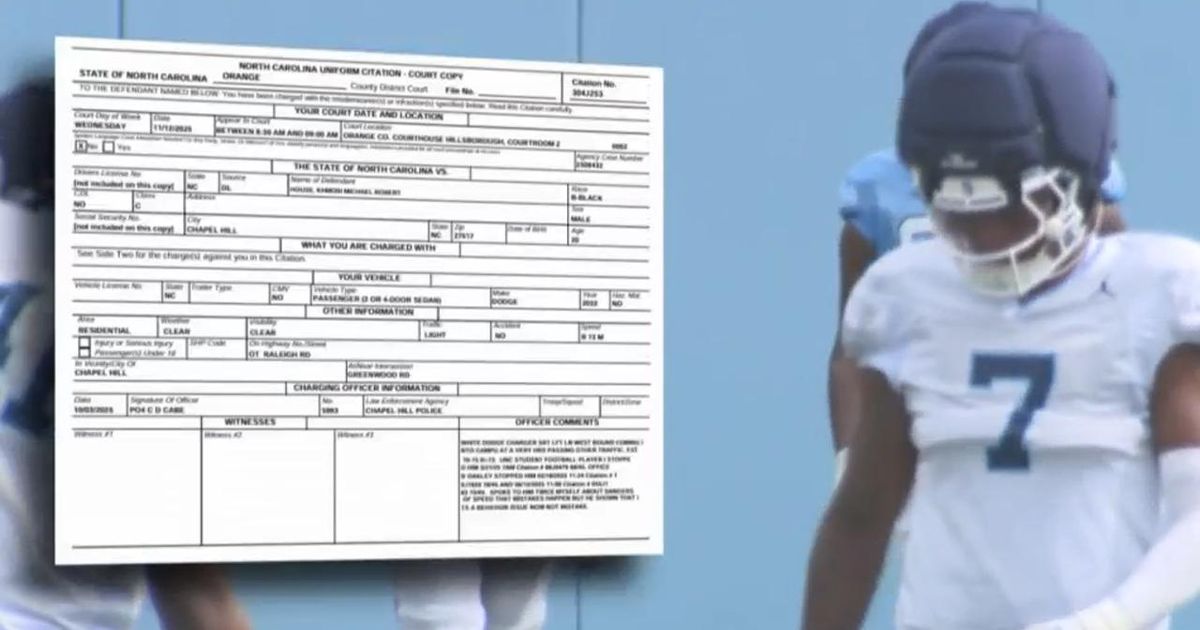An alarming trend has surfaced among college football players at the University of North Carolina, raising concerns about the driving habits of these young athletes and the potential risks they pose to themselves and the community.
A joint investigation by WRAL Sports and WRAL Investigates found a significant portion of the UNC football roster has received speeding and/or reckless driving charges over the past year.
Our detailed analysis of court records shows that nearly 20 percent of UNC’s 101-player roster has been cited for speeding since last October. This translates to 31 speeding charges and 10 reckless driving counts, with a significant portion attributed to athletes recruited under coach Bill Belichick.
In stark contrast, NC State’s larger roster of 124 players recorded only 10 speeding citations and two reckless driving charges, while Duke saw minimal infractions with only two players charged with speeding.
The gravity of these offenses cannot be overlooked, especially in light of past tragedies within the collegiate sports community.
In 2023, a University of Georgia player and staffer lost their lives in a high-speed crash involving teammates, prompting a crackdown on dangerous driving behaviors. Now, Georgia athletes who get in trouble behind the wheel lost their right to compensation for Name, Image and Likeness (NIL).
The dangers of speed impacted the UNC football program before Belichick was hired.
In January 2024, UNC student Molly Rotunda died in a single-car crash. She was a passenger in a car going 124 miles per hour. The driver, Flemeeja Brewer, pleaded guilty to felony death by vehicle, driving while impaired and speeding 124 mph in a 45 mph zone.
Court records show former UNC offensive lineman, Zach Rice, was following that car at a high rate of speed. He pleaded guilty to possession of alcohol by someone younger than 21 and driving after consuming alcohol.
Despite this, UNC has yet to implement effective measures to curb such behavior. WRAL asked football officials if any driving safety classes are required, whether players are required to report when they get tickets and whether any player has been disciplined for trouble on the road. We gave the school two days to answer those questions. UNC acknowledged WRAL’s question but chose not to respond.
Particularly concerning is the case of Khmori House, a recent transfer from the University of Washington, who has accumulated five speeding and four reckless driving charges within a short span.
On two of the citations, the law enforcement officers noted House’s Dodge Charger “must be too much car for him,” and that his repeated infractions are no longer a mistake, but a behavioral problem.
Two other players recruited by the Belichick regime have also had multiple run-ins with the law.
Thaddeus Dixon, another University of Washington transfer, received four tickets for speeding and one for reckless driving. On Feb. 22, Dixon was cited for reckless driving, going 93 in a 50-mph zone. In the citation, the officer noted that Dixon told him he was trying to pass another car.
In one of those tickets, Dixon was charged with going 93 in a 70 mile per hour zone and his car was not insured at the time. As recently as Nov. 13, Dixon was pulled over for speeding and was cited for driving with a revoked license.
Gavin Gibson also has one reckless driving charge and four speeding tickets, including one in a school zone that he pleaded down. During another traffic stop where Gibson was cited for going 90 in 70 zone, the officer wrote Gibson asked if the ticket was going to be for reckless driving. When the officer said “No,” Gibson was thankful.
Down the road at NC State, two cases caught our eye.
Wesley Grimes, a former Millbrook star and Wolfpack wide receiver, is accused of going 122 miles per hour on Interstate 540. Law enforcement says he was racing. That case is still pending.
Jonathan Paylor was charged with reckless driving on I-40 for going an estimated 100 miles per hour. When the trooper finally caught up to Paylor, the ticket notes Paylor apologized and said he was on the phone. He also told the trooper he played football at NC State.
We asked Wolfpack football about any intervention efforts, whether players were disciplined for driving infractions and whether players were required to report when they get pulled over. Spokeswoman Annabelle Myers responded almost immediately, saying no driving awareness training is provided to players, and they are not required to tell the team when they are ticketed.
In the era of NIL, our local schools aren’t the only ones dealing with similar problems as players make thousands, even millions of dollars while in school. However, as the college landscape continues to change, the alarming number of tickets, especially at UNC, raises questions about whether schools need to do a better job to recognize and address the issue, not only for player safety, but also those they share the road with.

